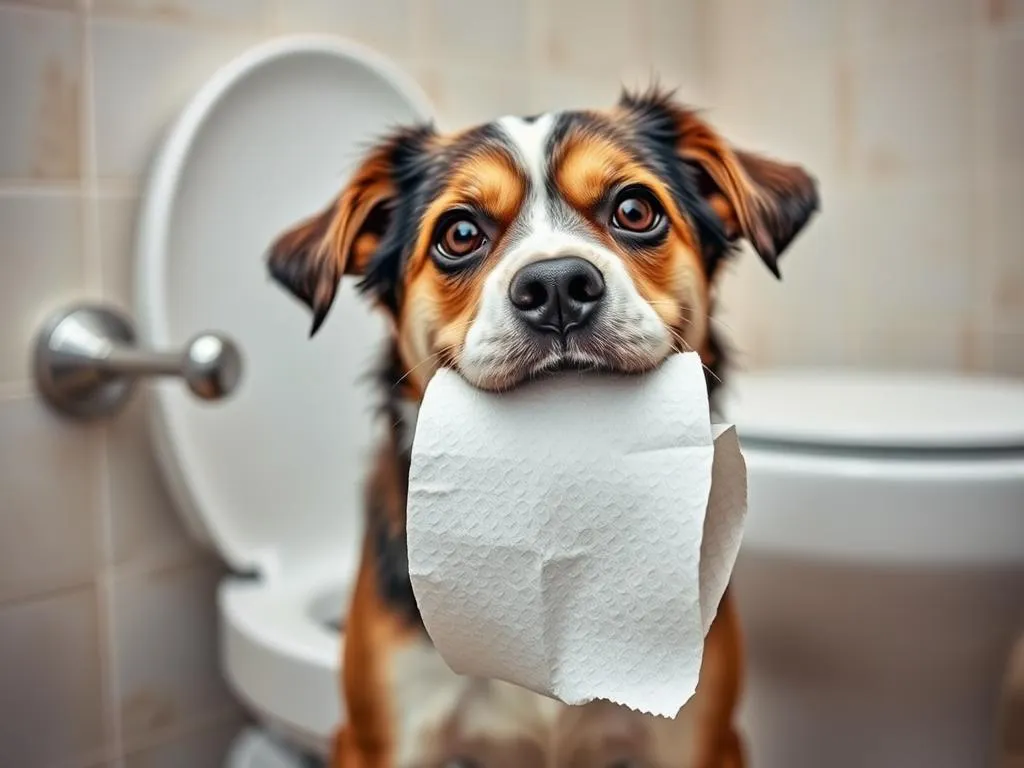
Understanding dog behavior is essential for any pet owner. Dogs, like humans, exhibit a variety of behaviors that can sometimes puzzle their owners. One behavior that often raises eyebrows is when dogs eat toilet paper. This seemingly odd habit can be frustrating, but it is important to understand why your furry friend might be indulging in this peculiar pastime.
Understanding Dog Behavior
The Nature of Dogs
Dogs are inherently curious creatures with strong instincts that govern their actions. From their wolf ancestors, they have retained traits such as exploration and chewing, which are critical for their survival and understanding of the environment. Their mouths are their primary tools for exploring the world, leading them to chew on and taste various objects, including toilet paper. Recognizing these natural behaviors can help pet owners train and care for their dogs more effectively.
Common Reasons for Unwanted Behaviors
Unwanted behaviors in dogs, such as eating toilet paper, often stem from various underlying issues. Stress, boredom, and anxiety are common culprits that can lead to destructive actions. By addressing these root causes, owners can not only resolve the specific behavior but also enhance their dog’s overall well-being.
Why Do Dogs Eat Toilet Paper?
Curiosity and Exploration
One of the primary reasons dogs eat toilet paper is their natural curiosity. Dogs explore their surroundings using their mouths. Paper, especially toilet paper, is lightweight, easy to tear, and offers an interesting texture that may attract them. This behavior can be particularly pronounced in puppies who are still learning about the world around them.
Attention-Seeking Behavior
Another reason dogs may munch on toilet paper is to grab their owner’s attention. Dogs are social animals and thrive on interaction with their humans. If a dog learns that ripping apart toilet paper draws a reaction—be it laughter, scolding, or any form of attention—they may continue the behavior. Understanding the psychology behind attention-seeking behaviors is crucial for managing this issue.
Boredom and Lack of Stimulation
Dogs require mental and physical stimulation to stay happy and healthy. When left alone for extended periods or without sufficient exercise, dogs can become bored, leading to destructive behaviors like eating toilet paper. Ensuring your dog has enough playtime and engaging activities is vital in preventing such habits.
Separation Anxiety
Separation anxiety is a condition that affects many dogs, causing them to feel distressed when left alone. This anxiety can manifest in various ways, including shredding paper products. If your dog displays signs of anxiety—such as excessive barking, pacing, or destructive behavior—it may be necessary to address their emotional needs and create a more secure environment.
Taste and Texture Preferences
Some dogs may simply enjoy the taste or texture of toilet paper. Dogs have unique preferences, and while toilet paper may not be a typical treat, its softness and slight scent can appeal to some. This instinctual tendency to chew on different materials can sometimes lead to the unfortunate habit of eating toilet paper.
Identifying the Underlying Cause
Observing Behavior Patterns
To effectively address the issue of why dogs eat toilet paper, owners should take the time to observe their dog’s behavior patterns. Documenting when and where the behavior occurs can help identify specific triggers. Is it happening when the owner leaves the house, or does it occur during quiet moments? Recognizing these patterns is the first step toward finding a solution.
Consulting with a Veterinarian
If the behavior persists or is accompanied by other unusual actions, consulting a veterinarian is essential. A professional can help rule out any underlying health issues that may contribute to the behavior, ensuring that your dog’s health is not at risk.
Solutions and Preventive Measures
Providing Adequate Stimulation
One of the most effective ways to prevent boredom-related behaviors is to ensure your dog receives ample physical and mental stimulation. Regular walks, playtime, and interactive games can keep your dog engaged. Consider incorporating puzzle toys that challenge your dog and reward them with treats to stimulate their minds.
Behavioral Training Techniques
Positive reinforcement training is a powerful tool for discouraging unwanted behaviors like eating toilet paper. When your dog refrains from chewing on the paper or engages with appropriate toys, reward them with praise or treats. This method reinforces good behavior and helps your dog understand what is acceptable.
Creating a Dog-Proof Environment
Preventing access to toilet paper is a straightforward yet effective solution. Keep bathroom doors closed or ensure that toilet paper rolls are stored in high or secured places. Additionally, consider dog-proofing your home by removing other tempting items that may lead to destructive behavior.
Addressing Anxiety Issues
For dogs experiencing separation anxiety, it is crucial to create a safe and calming environment. Gradual desensitization to being alone can help ease their fears. Products like anxiety vests or pheromone diffusers can also provide comfort. Engaging in calming exercises or training can further assist in reducing anxiety levels.
When to Seek Professional Help
Signs That Professional Help is Needed
If your dog’s toilet paper eating becomes excessive or is accompanied by other troubling behaviors, it may be time to seek professional help. Signs that indicate a more serious issue include frequent destructiveness, changes in appetite, or significant changes in behavior. Early intervention is key to addressing these problems effectively.
Working with a Professional Trainer or Behaviorist
Consulting a professional dog trainer or behaviorist can provide valuable insights and strategies tailored to your dog’s specific needs. These experts can evaluate your dog’s behavior and develop a personalized training plan. Owners can expect sessions to focus on positive reinforcement, behavior modification techniques, and ongoing support.
Conclusion
Understanding why dogs eat toilet paper is essential for fostering a positive relationship between pets and their owners. By recognizing the underlying causes of this behavior—be it curiosity, anxiety, or boredom—owners can take appropriate steps to address the issue. Creating a stimulating environment, utilizing training techniques, and seeking professional guidance when necessary can significantly improve your dog’s behavior. Embracing these strategies will not only help curb the toilet paper habit but also enhance the overall well-being of your furry friend.









